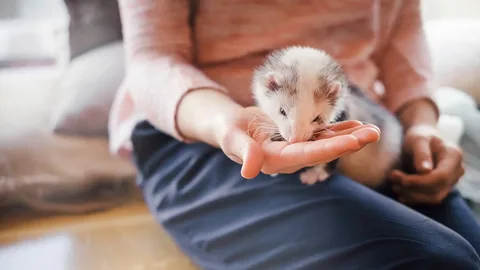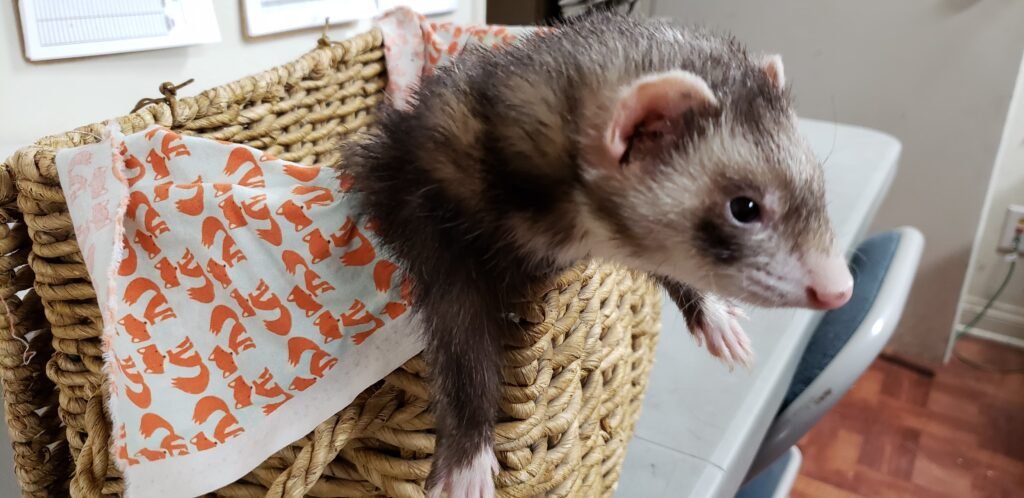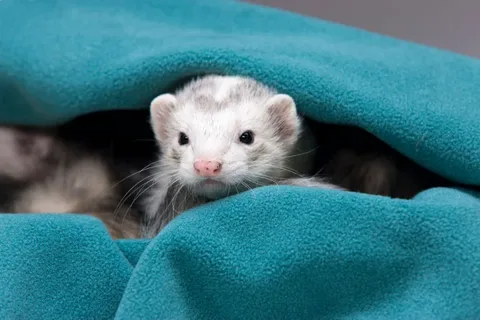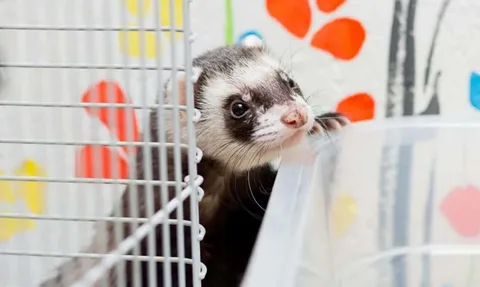Introduction:
Looking for a unique, intelligent, and endlessly entertaining pet? Ferrets might just steal your heart (and your socks). While cats and dogs are popular choices, ferrets are the quirky underdogs of the pet world. Curious, cuddly, and full of personality, they’re not only fun to watch but deeply rewarding to raise.
In this blog, we’ll explore why ferrets make awesome pets, what makes them so special, and what you need to know before adopting one.
- Ferrets Are Incredibly Playful and Social
Ferrets love to play, wrestle, chase, and explore. If you’ve ever seen one perform the infamous “weasel war dance,” you know how hilarious and energetic they are. Ferrets thrive on interaction and playtime, both with humans and other ferrets. Have at least 2–4 hours a day set aside for active play. Toys like tunnels, dig boxes, and teaser wands are great for stimulation.

- They’re Compact Yet Full of Character
Ferrets are small—usually weighing between 1 to 4 pounds—but their personalities are huge. Each ferret is different: some are bold and mischievous, while others are gentle and affectionate.They can adapt well to apartment living but need a spacious cage and regular time outside it.https://furryferrets.com/%f0%9f%90%be-cute-ferrets-everything-you-need-to-know/

- Ferrets Can Be Trained
Believe it or not, ferrets are quite trainable. With patience and positive reinforcement, they can learn to use a litter box, walk on a leash, and even do tricks like roll over or come when called.Start with short training sessions and reward with tasty treats like freeze-dried chicken.

- They’re Curious Explorers
Ferrets are natural investigators. They’ll dig under blankets, climb into drawers, and disappear into couch cushions. This makes them incredibly entertaining but also a bit of a handful.Ferret-proofing your space is essential: block off tight gaps, hide electrical cords, and remove anything chewable or toxic.Ferret-proofing your space is essential: block off tight gaps, hide electrical cords, and remove anything chewable or toxic.https://www.cdc.gov/healthy-pets/about/ferrets.html

- They’re Affectionate and Bond Closely with Their Humans
Ferrets often form strong attachments to their owners. They may follow you around, curl up in your lap, or give gentle licks. While they’re not clingy like some pets, they definitely enjoy companionship.If kept alone, a ferret needs daily one-on-one attention to prevent loneliness or depression.

- Their Care Needs Are Manageable
Ferrets eat a high-protein, meat-based diet. You can feed them high-quality ferret kibble or, with research and vet approval, a raw diet. They also need regular cage cleaning, fresh water, and occasional grooming (like nail trims and ear cleaning).Unlike some exotic pets, ferrets don’t require complicated lighting or temperature control.

- They Live 6–10 Years
Ferrets live longer than many expect—typically 6 to 10 years. This makes them a solid long-term commitment for those who want a loyal, fun-loving companion over many years.Adopt from a reputable breeder, rescue, or shelter to ensure your ferret is healthy and well-socialized.

- They’re Legal in Most—but Not All—Places
Before bringing home a ferret, check your local laws. Ferrets are illegal or restricted in some states (like California and Hawaii) and cities (such as New York City). Make sure to also find an exotic vet nearby who is familiar with ferret health needs.

- They’re Naturally Clean—but Not Odor-Free
Ferrets have scent glands that give off a musky odor, even if they’ve been descented. Males tend to be smellier than females, especially if unneutered. However, with proper cage cleaning, quality bedding, and good hygiene practices, odor can be kept to a minimum.Avoid overbathing—once a month or less is plenty.

- They Need Enrichment to Stay Happy
Boredom is a common cause of behavioral issues in ferrets. Enrichment through interactive toys, rotating play items, treat puzzles, and outdoor play (with a harness) helps keep their minds and bodies active.Set up a dig box, switch out toys weekly, and hide treats for them to “hunt.”

Conclusion:
Ferrets are not your average pet—but that’s exactly what makes them special. With their comical antics, big personalities, and loving nature, ferrets make surprisingly awesome companions. They do require time, effort, and a bit of research, but the reward is a lifelong bond with one of the most entertaining animals you’ll ever meet.
FAQs
Q1. Do ferrets get along with cats or dogs?
It depends on the individual animals. Some ferrets coexist peacefully with calm pets, while others may not. Supervise interactions and introduce slowly.
Q2. Can I keep a ferret in a small apartment?
Yes—ferrets adapt well to small spaces as long as they get enough out-of-cage playtime and mental stimulation.
Q3. Are ferrets good pets for beginners?
Ferrets can be great for first-time pet owners willing to research and commit to their care. They’re not low-maintenance but are highly rewarding.
Q4. How expensive is it to care for a ferret?
Initial setup can cost $300–$500. Ongoing monthly costs for food, litter, and care range from $40–$100, not including vet expenses.
Q5. Can ferrets be left alone during the day?
Yes, but not all day every day. If you work full-time, be sure to spend quality time with them in the mornings and evenings—or consider adopting a pair.
